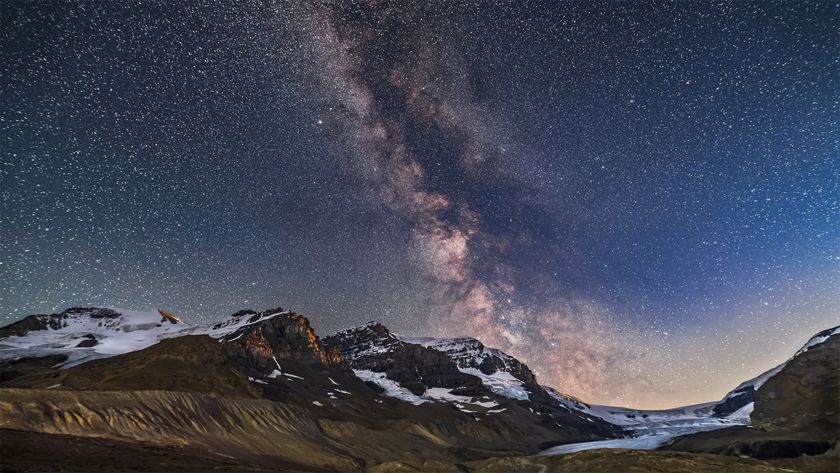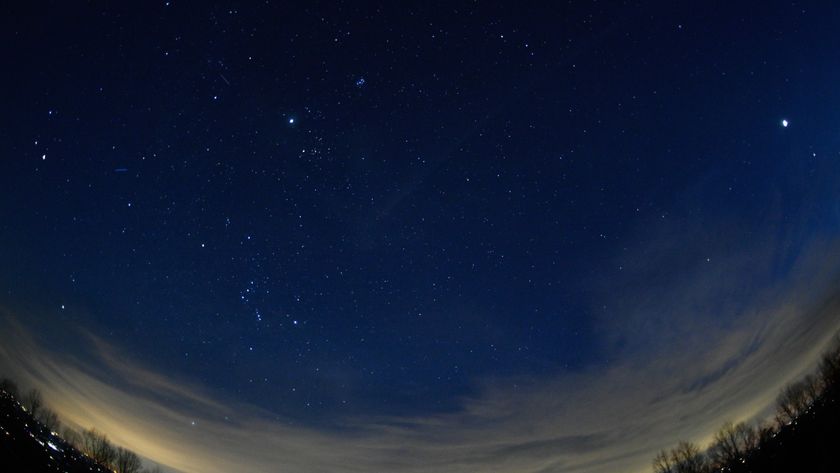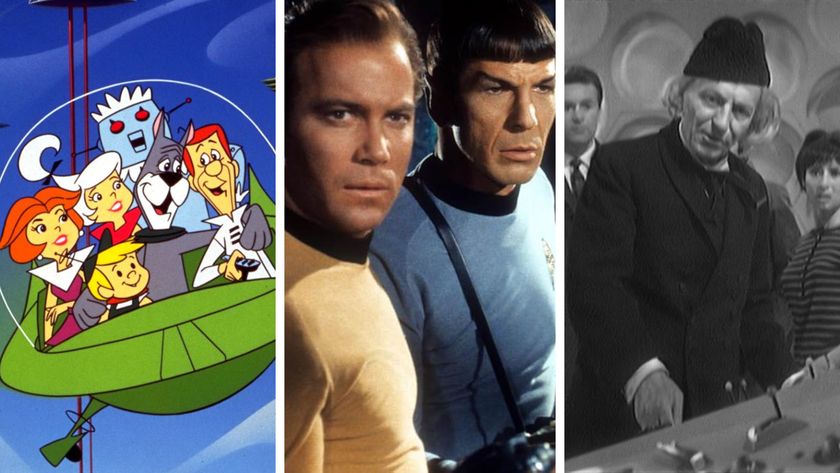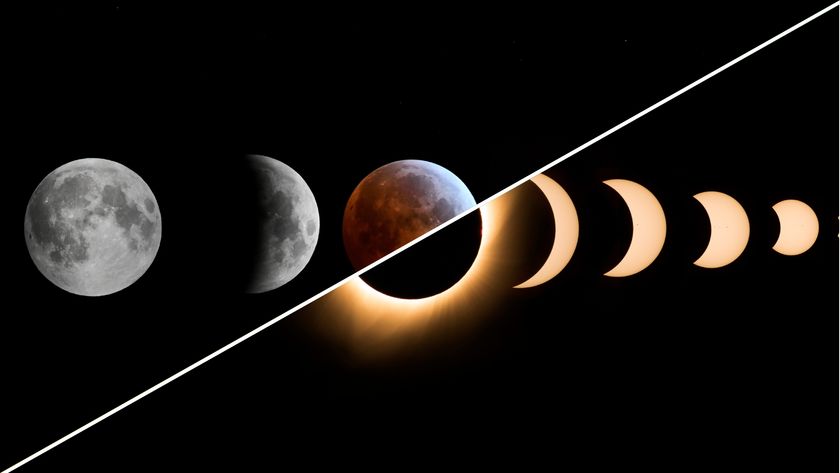Space calendar 2025: Rocket launches, skywatching events, missions & more!
Keep up to date with the latest space events with our 2025 space calendar!
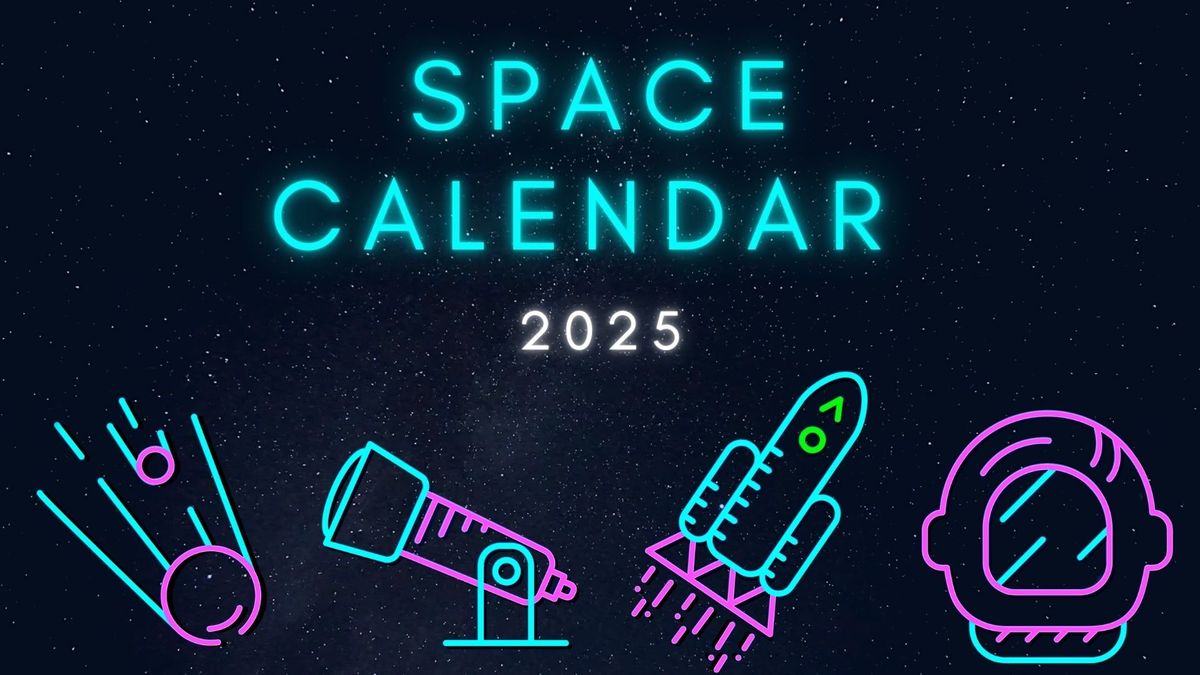
2025 is a busy year for spaceflight and exploration enthusiasts with countless launches, mission milestones and skywatching events to look forward to.
With so much going on, it's hard to keep track of everything. Never fear — keep up with the latest events in our 2025 space calendar. You can also Find out what's up in the night sky this month with our visible planets guide and skywatching forecast.
Please note: Launch dates are subject to change and will be updated throughout the year as firmer dates arise. Please DO NOT schedule travel based on a date you see here. Launch dates are collected from NASA events, ESA news, Roscosmos space launch schedule, Spaceflight Now launch schedule, Everyday Astronaut, Supercluster and others.
Related: Wondering what happened today in space history? Check out our "On This Day in Space" video!
Is there a rocket launch today?
March 2025

March 28, 6:30 a.m. EDT (1030 GMT): Northrop Grumman’s uncrewed Cygnus spacecraft is scheduled to depart the International Space Station. The cargo vehicle launched on the NG-21 mission in August 2024, delivering more than 8,200 pounds of supplies, scientific investigations, commercial products, hardware, and other cargo to the ISS. Filled with refuse from the orbital lab, Cygnus will be placed on a deorbit trajectory to safely burn up in Earth’s atmosphere on Sunday, March 30.

March 28, 7:30 a.m. EDT (1230 GMT): The maiden flight of the first orbital rocket to launch from Europe is set to take place no earlier than March 24. Isar Aerospace’s Spectrum rocket will launch from Andøya Spaceport, in Norway, on the vehicle's first test flight. The mission will launch without a payload, and is designed to allow Isar Aerospace to collect as much data as possible in order to refine the development of their Spectrum rocket.

March 29, 4:50 a.m. - 8:43 a.m. EDT (0850 - 1243 GMT): A deep partial solar eclipse will be visible from the Northern Hemisphere. Although the moon's central shadow will miss Earth and there will be no totality, it will still be a relatively major solar eclipse. It will be best seen from New Brunswick and far northern Quebec in Canada, as well as from Maine, Central and Western Europe, as well as northwestern Russia.
-
Read more: Partial solar eclipse March 2025: Everything you need to know

March 29, 12:05 p.m. ET (1605 GMT): The China Aerospace Science and Technology Corporation (CASC) is expected to launch an unknown payload on a Long March 7A rocket. The mission will liftoff from Wenchang Space Launch Center, in China. The Long March 7A is a 197-foot-tall (60 meters) variant of the Long March 7 rocket and is designed to send spacecraft into GTO. It is also a nontoxic alternative to the workhorse Long March 3B.

March 30, 3:16 p.m. EDT (1916 GMT): A SpaceX Falcon 9 rocket will launch a batch of Starlink satellites into low-Earth orbit (LEO), from SLC-40, at Cape Canaveral Space Force Base, in Florida. SpaceX's megaconstellation of LEO Starlink satellites provide low-cost internet to locations around the globe, with nearly seven thousand currently in the orbital network.

March 30: Rocket Lab will launch a HASTE (Hypersonic Accelerator Suborbital Test Electron) rocket from the company's Launch Complex 2, at NASA's Wallops Flight Facility, in Virginia. The payload, DART AE, is a 3D-printed hypersonic drone developed under the Hypersonic and High-Cadence Airborne Testing (HyCAT) program at the Pentagon's Defense Innovation Unit (DIU).

March 30, 8:00 p.m. EDT (0000 GMT, March 31): Australian company Gilmour Space has announced a launch window opening March 14 for its first-ever orbital launch attempt. Eris is the first Australian-designed and built rocket aiming for orbit. It stands at 82 feet (25 meters) tall and can deliver a payload of up to 474 pounds (215 kilograms) to a 310-mile-altitude (500 kilometers) sun-synchronous orbit. Eris consists of three stages and uses hybrid propulsion.
-
Read more: The 1st Australian rocket to launch from Australian soil could reach orbit this month

NET March 30: Firefly Aerospace will launch its second mission for Lockheed Martin, and its first of up to 25 for Lockheed over the next five years. The mission, "Message in a Booster", is part of a multi-launch agreement signed between the two companies, and will the LM 400 tech demo for a Lockheed satellite bus under development.

March 30: United Launch Alliance (ULA) will launch an Atlas V 551 rocket to deliver a batch of Project Kuiper megaconstellation internet satellites to low-Earth orbit. Liftoff will take place from ULA's Space Launch Complex-41 (SLC-41), at the Cape Canaveral Space Force Station, in Florida.

March 31, 2:30 p.m. ET (1830 GMT): After completing a long-duration stay aboard the International Space Station, NASA’s SpaceX Crew-9 astronauts will discuss their science mission during a post-flight news conference from the agency’s Johnson Space Center in Houston. Watch live coverage on NASA+.

March 31, 11:20 p.m. EDT (0320 GMT, April 1): SpaceX plans to make spaceflight history by launching a Dragon spacecraft on the first crewed mission into polar orbit. Fram2 will be commanded by Maltese entrepreneur Chun Wang, SpaceX announced. Wang is joined by vehicle commander Jannicke Mikkelsen, from Norway, Eric Philips of Australia, as pilot, and mission specialist Rabea Rogge, from Germany.
-
Read more: SpaceX to launch 4 people on historic Fram2 mission over Earth's poles

March 30, 8:23 p.m. EDT (0023 GMT, March 31): A SpaceX Falcon 9 rocket will launch a batch of Starlink satellites into low-Earth orbit (LEO), from SLC-4E; Vandenberg Space Force Base, California. SpaceX's megaconstellation of LEO Starlink satellites provide low-cost internet to locations around the globe, with nearly seven thousand currently in the orbital network.
-
Booster return: Droneship, Pacific Ocean
April 2025

April 1, 8:00 p.m. EDT (0000 GMT, March 31): A SpaceX Falcon 9 rocket will launch a batch of Starlink satellites into low-Earth orbit (LEO), from SLC-40, at Cape Canaveral Space Force Base, in Florida. SpaceX's megaconstellation of LEO Starlink satellites provide low-cost internet to locations around the globe, with nearly seven thousand currently in the orbital network.

April 5-6: NEAF is the world’s preeminent symposium for award winning talks, workshops, classes, and conferences. NEAF is an annual gathering of more than 4,000 professionals, amateurs, and space and astronomy enthusiasts, all coming together to share interests and passions.
-
NEAF brings over 120 vendors and exhibiters from around the world, representing every major manufacturer and dealer in the business, which also makes it one of the largest trade shows and collaborative venues of its kind in the world, not to mention an enthusiast’s shopping paradise.

April 7-10: Space Symposium, held at The Broadmoor and Cheyenne Mountain Resort in Colorado Springs, Colorado, USA, has brought together space leaders from around the world to discuss, address, and plan for the future of space since the inaugural event in 1984. Attendees at that original event numbered 250 space enthusiasts. At the 40th Space Symposium (April 7-10, 2025), over 10,000 people from more than 40 countries participated in the event. Space Symposium has become widely known as the premier U.S. space policy and program forum and as the must-attend event for information and interaction among all sectors of space.

NET April 8, 1:47 a.m. ET (0647 GMT): Roscosmos cosmonauts Sergei Ryzhikov and Alexei Zubritsky and NASA astronaut Jonathan Kim will launch aboard Soyuz MS-27 from Baikonur Cosmodrome, to join fellow Expedition 73 crew members aboard the International Space Station (ISS).

April 7-10: The Apophis T-4 Years: Knowledge Opportunity for the Science of Planetary Defense workshop will be held at the University of Tokyo, Hongō Campus in Tokyo, Japan. This workshop will focus on international collaboration opportunities for both Earth–based observations and in situ investigations, the OSIRIS–APEX mission, Destiny+, and other implementable mission or instrument concepts. There are adjacent workshops at the same location dedicated to Hera (April 7–8, 2025) and RAMSES (April 11, 2025). Apophis T-4 (April 9–10, 2025) will place the greatest emphasis on Apophis science.

April 12: Look to the east shortly after sunset to see the full moon rise above the horizon. The moon will be in the Virgo constellation, and will have most of the night to enjoy the night sky by itself while the planets are situated on the other side of Earth. The name of April's Full Pink Moon is believed to come a pink flower known as the ground phlox, which commonly blooms in North America around this time. Other names for the celestial event include the Sprouting Grass Moon, Egg Moon and Fish Moon. The moon will begin peaking above the horizon on the U.S. eastern coast beginning at 8:22 p.m. EDT (2322 GMT).

April 13: A SpaceX Falcon 9 rocket will launch NASA's TRACERS mission, carrying a pair of synchronized spacecraft to orbit. TRACERS will study magnetic reconnection Earth’s atmosphere caused by interaction with passing solar activity, and help researchers better understand and prepare for impacts of solar activity on Earth.

April 14, 9:30 a.m. ET (1330 GMT): Blue Origin will launch its New Shepard rocket on the NS-31 mission — carrying the first ever all-female crew of six passengers on a suborbital flight. This will be New Shepard's third launch of 2025, and its eleventh overall crewed flight. Aboard, Katy Perry, Aisha Bowe, Kerianne Flynn, Gayle King, Amanda Nguyen and Lauren Sánchez.
-
Watch the launch on Space.com, courtesy of Blue Origin's livestream, which will begin about 15 minutes before liftoff.
-
Booster and capsule return: West Texas
-
Read more: Katy Perry will launch to space with historic all-female crew on Blue Origin rocket

April 21: SpaceX will launch the 32nd Commercial Resupply mission (CRS-32) for NASA from Launch Complex-39A, at the Kennedy Space Center, in Florida. Each resupply mission to the station delivers scientific investigations in the areas of biology and biotechnology, Earth and space science, physical sciences, and technology development and demonstrations.
-
Booster landing at LZ-1, at Cape Canaveral Space Force Station

April 2025: United Launch Alliance (ULA)'s Vulcan Centaur rocket will fly its first of more than two dozen U.S. Space Force missions allocated under a national security space launch contract. USSF-106 is expected to launch sometime in the second quarter of 2025.
-
Read more: Powerful new Vulcan Centaur rocket gearing up for 1st Space Force mission
May 2025

May 5-9: The International Academy of Astronautics (IAA) will hold the 2025 Planetary Defense Conference in Stellenbosch, Cape Town, South Africa

May 12: The Full Flower Moon rises on May 12. The official moment when the full moon reaches 100% fullness will occur on May 23 at 12:56 p.m. EDT (1656 GMT), according to the U.S. Naval Observatory.

May 28-29: H2M2 will gather the top experts in Moon and Mars architecture, science, human health, innovation, policy, STEM education, and innumerable other disciplines who will provide the latest news about and generate momentum for our Moon and Mars goals.
-
The objective of H2M2 is to advance the goal of a sustainable and permanent human presence on the Moon beginning in the late 2020s and on Mars no later than the 2030s.

May 29 - June 2: Contact in the Desert has been the world’s leading event for those intrigued by UFOs, UAPs, and extraterrestrial life. Our mission is to provide a platform for open discussions, cutting-edge research, and firsthand experiences in the field of unexplained phenomena. Each year, thousands gather to connect with experts, share stories, and dive deep into the mysteries of our universe.

NET May 2025: United Launch Alliance (ULA) will launch Sierra Space's Dream Chaser space plane aboard a Vulcan Centaur rocket. The mission will launch from Space Launch Complex-41 (SLC-41), at Cape Canaveral Space Force Station, in Florida. the first-ever winged commercial spaceplane, to the International Space Station.
-
Read more: ULA delays Dream Chaser space plane launch to certify Vulcan Centaur rocket for US military missions

Spring 2025: SpaceX will launch the fourth crewed mission for Houston-based company Axiom Space. Former NASA astronaut Peggy Whitson will be joined by Shubhanshu Shukla of India, the of the European Space Agency's (ESA) Sławosz Uznański, from Poland, and Tibor Kapu of Hungary. The quartet will launch to the ISS on a mission to conduct scientific research, demonstrate technology and the continued commercialization of space.
-
Read more: Meet the crew for Axiom Space's Ax-4 mission to the ISS
June 2025

June 11: The Full Flower Moon rises at 3:44 a.m. EDT (0844 GMT). In the Old Farmer's Almanac, the full moon of June is called a Strawberry moon, from the berries that appear in the summer months in the northeastern parts of North America.

June 19-22: The annual International Space Development Conference (ISDC) is the keynote event of the National Space Society, bringing together leading managers, engineers, scientists, educators, enthusiasts, and business people from civilian, military, commercial, entrepreneurial, and grassroots advocacy space sectors - all working toward the common goal of developing a spacefaring civilization.
July 2025

July 10: The July full moon is also known as the Buck Moon or the Thunder Moon, the former because it coincides with the time of year when male deer antlers are in full growth and the latter because it is also when thunderstorms are common in many parts of the world. The moon will officially reach full illumination at 4:37 p.m. EDT (2137 GMT) on July 10, but still appears relatively full for a few days around the peak.
August 2025
2026

NET May 2026: California-based startup Vast Space plans to loft its Haven-1 outpost aboard a SpaceX Falcon 9 rocket no earlier than May 2026. Haven-1 — which will eventually be incorporated as a module into a larger space station, and will be followed in quick succession by Vast-1, a four-person jaunt to the new station that could last up to 30 days. Vast-1 will also launch atop a Falcon 9, and its astronauts will ride on a SpaceX Dragon capsule.
-
Read more: SpaceX and Vast want ideas for science experiments on Dragon spacecraft and Haven-1 space station

NET Spring 2026: Artemis 2 is the second scheduled flight of the Artemis program and the first crewed Artemis mission. Three astronauts from NASA and one from the Canadian Space Agency will use on a Space Launch System (SLS) rocket aboard the Orion spacecraft on the lunar flyby mission.
-
NASA commander Reid Wiseman, NASA pilot Victor Glover, NASA mission specialist Christina Koch and CSA mission specialist Jeremy Hansen will fly around the moon on a roughly 10-day-long mission.
Past Events

March 26, 6:11:40 p.m. EDT (2211 GMT): A SpaceX Falcon 9 rocket will launch a batch of Starlink satellites into low-Earth orbit (LEO), from SLC-4E; Vandenberg Space Force Base, California. SpaceX's megaconstellation of LEO Starlink satellites provide low-cost internet to locations around the globe, with nearly seven thousand currently in the orbital network.
-
Booster return: Droneship, Pacific Ocean

March 26, 11:55 a.m. EDT (1555 GMT): The China Aerospace Science and Technology Corporation (CASC) is expected to launch an unknown payload on a Long March 3B heavy-lift rocket. The mission will liftoff from LC-3, at the Xichang Satellite Launch Center (XSLC), in China. The Long March 3B rocket is capable of lifting large payloads to geostationary transfer orbit.

March 26, 11:30 a.m. ET (1530 GMT, 0730 local NZ, March 27): Rocket Lab will launch an Electron rocket from the company's Launch Complex 1 in Mahia, New Zealand, on the Finding Hot Wildfires Near You mission. The payload comes from wildlife detection and monitoring company OroraTech, and consists of eight OroraTech Constellation Phase 1 satellites. Electron will deliver the group to a 340-mile (550-kilometer) orbit, and will provide data for the upcoming wildfire season.

March 24, 1:48 p.m. EDT (1742 GMT): A SpaceX Falcon 9 rocket will launch a classified payload for the National Reconnaissance Office, from SLC-41; Cape Canaveral Space Force Station, in Florida. SpaceX is planning to land this booster on a droneship in the Pacific Ocean.

March 21, 7:10 a.m. ET (1110 GMT): Private Chinese space launch company Galactic Energy is expected to launch an unknown payload on a Ceres 1 rocket. The mission will liftoff from Site-95A, at the Jiuquan Satellite Launch Center, in China.

March 21, 2:49 a.m. EDT (0649 GMT; 11:49 p.m. PDT, local time): A SpaceX Falcon 9 rocket will launch a classified payload for the National Reconnaissance Office, from SLC-4E at Vandenberg Space Force Base, in California. SpaceX is planning to land this booster at Landing Zone-4; Vandenberg Space Force Base, California

March 20: The equinoxes mark the astronomical beginning of spring or autumn, depending on the hemisphere. However, the meteorological beginning of these seasons is March 1 and Sept. 1. In the Northern Hemisphere, the March equinox heralds the beginning of spring and is referred to as the spring or vernal equinox (vernal comes from the Latin term "ver" for spring). At the same time, the Southern Hemisphere shifts into autumn. The converse is true in September when the northern half of the planet descends into the colder months of autumn and the southern half enters spring.

March 18, 6:00 p.m. ET (2300 GMT): A SpaceX Falcon 9 rocket will launch a batch of Starlink satellites into low-Earth orbit (LEO), from SLC-40, at Cape Canaveral Space Force Base (CCSFB), in Florida. SpaceX's megaconstellation of LEO Starlink satellites provide low-cost internet to locations around the globe, with nearly seven thousand currently in the orbital network.
-
Booster return: Droneship, Atlantic Ocean

March 17, 4:07 a.m. ET (0807 GMT): Private Chinese space launch company Galactic Energy is expected to launch an unknown payload on a Ceres 1 rocket. The mission will liftoff from Site-95A, at the Jiuquan Satellite Launch Center, in China.

March 15, 7:35 a.m. ET (1135 GMT): A SpaceX Falcon 9 rocket will launch a batch of Starlink satellites into low-Earth orbit (LEO), from SLC-40, at Cape Canaveral Space Force Base (CCSFB), in Florida. SpaceX's megaconstellation of LEO Starlink satellites provide low-cost internet to locations around the globe, with nearly seven thousand currently in the orbital network.
-
Booster return: Droneship, Atlantic Ocean

March 15, 2:43 a.m. ET (0743 GMT): SpaceX will launch a As its name suggests, Transporter 13 is the 13th mission in SpaceX's Transporter series, part of the company's SmallSat Rideshare Program to provide small satellite operators with affordable, regularly scheduled Falcon 9 rideshare missions to orbit.

March 14: March's full moon is known as the Worm Moon, and this year is paired with a total lunar eclipse. The total lunar eclipse will be visible from start to finish across the United States. Parts of Europe, Asia, Australia, South America, Pacific and Africa will experience at least some part of the eclipse. The full portion of the eclipse will start at 2:36 a.m. EDT (0636 GMT). Maximum eclipse will occur at 2:58 a.m. EDT (0658 GMT). The full eclipse portion of the lunar eclipse will end at 3:31 EDT (0731 GMT).

March 14, 8:00 p.m. ET (0100 GMT, Mar. 10): Rocket Lab will launch an Electron rocket from the company's Pad B, at Launch Complex 1 in Mahia, New Zealand. The mission will launch a synthetic aperture radar (SAR) imaging satellite for iQPS called QPS-SAR-9 (nicknamed “SUSANOO-I”). The spacecraft will join iQPS’ growing constellation to deliver frequent high-resolution Earth-imaging of specific locations around the globe.

March 14, 7:03 p.m. EDT (2310 GMT): SpaceX's tenth crewed mission to the International Space Station (ISS) for NASA, will launch from Launch Comlex-39A; Kenney Space Center, in Florida. Crew-10 was originally slated to fly in February, but was been pushed back to allow time for SpaceX to complete work on a brand-new Crew Dragon spacecraft, being used for the mission.
-
Booster return: Landing Zone-1, Cape Canaveral, FL
-
Read more: Boeing Starliner astronauts will return to Earth in March 2025 after new NASA, SpaceX delay

March 12, 10:35 a.m. ET (0235 GMT, March 13): A SpaceX Falcon 9 rocket will launch a batch of Starlink satellites into low-Earth orbit (LEO), from SLC-40, at Cape Canaveral Space Force Base (CCSFB), in Florida. SpaceX's megaconstellation of LEO Starlink satellites provide low-cost internet to locations around the globe, with nearly seven thousand currently in the orbital network.
-
Booster return: Droneship, Atlantic Ocean

March 11, 11:10 p.m. ET (0310 GMT, March 12): A SpaceX Falcon 9 rocket will launch a double-mission for NASA, carrying a total of five payloads to orbit. The mission will liftoff from Space Launch Complex-40 (SLC-40) at Vandenberg Space Force Base (VSFB), in California. The Spectro-Photometer for the History of the Universe, Epoch of Reionization and Ices Explorer (SPHEREx) is a car-sized observatory that will map the entire sky in 3D by cataloguing the millions of stars and galaxies visible from our planet in every direction. The second payload is a constellation of four small satellites flying NASA's PUNCH mission (Polarimeter to Unify the Corona and Heliosphere). The satellites are headed to low-Earth orbit (LEO), where they'll observe the sun's corona, to study how mass and energy transform into solar wind.
-
Booster return: Landing Zone-4, VSFB
-
Read more: SpaceX launch of NASA's new 3D-sky-mapping satellite set for February 2025

March 6, 6:30 p.m. ET (0030 GMT, Mar. 7): SpaceX will launch its eighth integrated flight test (IFT-8) for its Starship megarocket. The mission will liftoff from SpaceX's Starbase facility in South Texas. The launch will be the second flight of SpaceX's newer version Starship, which broke up in orbit during its last mission. The launch is expected following an investigation into IFT-7 by the U.S. Federal Aviation Administration (FAA).
-
Booster return: Pad-A, Starbase, Texas
-
Starship return: Splashdown, Indian Ocean

March 6, 11:24 a.m. ET (1624 GMT): Ariane 6 is gearing up for its second mission. The launch will carry the CSO-3 spy satellite into orbit for France's military. The Ariane 6 launched for the first time from Europe's Spaceport in Kourou, French Guiana, in July 2024 after lengthy delays.
-
Read more: Europe's new Ariane 6 heavy-lift rocket launching for 2nd time ever today: Watch live

March 2, 9:24 p.m. ET (0224 GMT, Mar. 3): A SpaceX Falcon 9 rocket will launch a batch of Starlink satellites into low-Earth orbit (LEO), from SLC-40, at Cape Canaveral Space Force Base (CCSFB), in Florida. SpaceX's megaconstellation of LEO Starlink satellites provide low-cost internet to locations around the globe, with nearly seven thousand currently in the orbital network.
-
Booster return: Droneship, Atlantic Ocean

March 2, 2:10 a.m. ET (0710 GMT): Private Chinese space launch company Galactic Energy is expected to launch an unknown payload on a Ceres 1 rocket. The mission will liftoff from Site-95A, at the Jiuquan Satellite Launch Center, in China.
February 2025

February 27, 4:24 p.m. ET (2124 GMT): The Russian space agency (Roscosmos) will launch the 91st Progress cargo delivery mission to the International Space Station (ISS). Progress 91 (91P) will carry fresh food and supplies for the ISS crew, and is expected to remain docked for several months.

February 27, 2:10 a.m. ET (0710 GMT): The China Aerospace Science and Technology Corporation (CASC) is expected to launch an unknown payload on a Long March 2C rocket. The mission will liftoff from Site 9401, at the Jiuquan Satellite Launch Center, in China.

February 26, 10:34 p.m. ET (0334 GMT, Feb. 27): A SpaceX Falcon 9 rocket will launch a batch of Starlink satellites into low-Earth orbit (LEO), from SLC-40, at Cape Canaveral Space Force Base, in Florida. SpaceX's megaconstellation of LEO Starlink satellites provide low-cost internet to locations around the globe, with nearly seven thousand currently in the orbital network.
-
Booster return: Droneship, Atlantic Ocean

February 26, 7:17 p.m. ET (0117 GMT, Feb. 27): Intuitive Machines is scheduled to launch its next moon lander NET Feb. 26, 7:17 p.m. ET (0117 GMT, Feb. 27):. IM-2 is headed to the moon's Mons Mouton region located about 100 miles (160 km) from the south pole. IM-2 will carry a number of Commercial Lunar Payload Services (CLPS) payloads for NASA, including an instrument that will help confirm the abundance of water ice in the area.
-
Booster return: Droneship, Atlantic Ocean
-
Shooting for the moon, Intuitive Machines to launch daring lunar lander for NASA on Feb. 26

February 25, 10:30 a.m. ET (1530 GMT): Blue Origin will launch its New Shepard rocket on the NS-30 mission — carry six passengers on a suborbital flight. This will be New Shepard's second launch of 2025, and its tenth overall crewed flight. Aboard, Lane Bess, Jesús Calleja, Elaine Chia Hyde, Richard Scott and Tushar Shah.
-
Watch the launch on Space.com, courtesy of Blue Origin's livestream, which will begin about 15 minutes before liftoff.
-
Booster and capsule return: West Texas
-
Read more: Jeff Bezos' Blue Origin announces crew for 10th space tourism launch

February 22, 8:38 p.m. ET (0338 GMT, Feb. 23): A SpaceX Falcon 9 rocket will launch a batch of Starlink satellites into low-Earth orbit (LEO), from SLC-4E at Vandenberg Space Force Base, in California. SpaceX's megaconstellation of LEO Starlink satellites provide low-cost internet to locations around the globe, with nearly seven thousand currently in the orbital network.
-
Booster return: Of Course I Still Love You droneship, Pacific Ocean

February 22, 7:10 a.m. ET (1210 GMT): The China Aerospace Science and Technology Corporation (CASC) is expected to launch an unknown payload on a Long March 3B heavy-lift rocket. The mission will liftoff from LC-3, at the Xichang Satellite Launch Center (XSLC), in China. The Long March 3B rocket is capable of lifting large payloads to geostationary transfer orbit.

February 21, 10:19 a.m. ET (1519 GMT): A SpaceX Falcon 9 rocket will launch a batch of Starlink satellites into low-Earth orbit (LEO), from SLC-40, at Cape Canaveral Space Force Base, in Florida. SpaceX's megaconstellation of LEO Starlink satellites provide low-cost internet to locations around the globe, with nearly seven thousand currently in the orbital network.

February 18, 6:15p.m. ET (2315 GMT): A SpaceX Falcon 9 rocket will launch a batch of 23 Starlink satellites into low-Earth orbit (LEO), from SLC-40, at Cape Canaveral Space Force Base, in Florida. SpaceX's megaconstellation of LEO Starlink satellites provide low-cost internet to locations around the globe, with nearly 7,000 currently in the orbital network. The missions Falcon 9 booster will touchdown off the coast of the Bahamas on SpaceX's Just Read the Instructions droneship about 8.5 minutes after launch.
-
The window for this launch is open until 9:35 p.m. ET (0235 GMT, Feb. 19). If needed, additional opportunities are also available on Wednesday, Feb. 19, starting at 6:05p.m. ET (2305 GMT).
-
This will be SpaceX's 22nd launch of 2025, including 1 Starship launch.

February 18, 6:15 p.m. ET (2315 GMT, 12:15 pm NZDT, Feb. 19): Rocket Lab will launch an Electron rocket from the company's Pad B, at Launch Complex 1 in Mahia, New Zealand. The mission, Fasten Your Space Belts, is the ninth contracted by BlackSky, a space-based imagery and analytics intelligence provider. The 35cm high-resolution Gen-3 satellites, enhancing the company's geospatial capabilities.

February 15, 1:14 a.m. ET (0614 GMT): A SpaceX Falcon 9 rocket will launch a batch of 21 Starlink satellites into low-Earth orbit (LEO), from SLC-40, at Cape Canaveral Space Force Base, in Florida. This includes 13 satellites with Direct to Cell capabilities. The launch window lasts until 2:15 a.m. ET (0715 GMT), with backup opportunities Sunday, Feb. 16 starting at 12:41 a.m. ET. This will be the 26th mission for the Falcon 9 booster, which has previously flown 14 Starlink launches. SpaceX's megaconstellation of LEO Starlink satellites provide low-cost internet to locations around the globe, with nearly seven thousand currently in the orbital network.
-
This will be SpaceX's 21st launch of 2025, including 1 Starship launch.

February 12: February's full moon, the Snow Moon, will rise bright in the daytime, peaking above the horizon on the U.S. eastern coast beginning at 8:53 a.m. ET (1353 GMT).

February 11, 6:53p.m. ET (2353 GMT): A SpaceX Falcon 9 rocket will launch a batch of 21 Starlink satellites into low-Earth orbit (LEO), from SLC-40, at Cape Canaveral Space Force Base, in Florida. SpaceX's megaconstellation of LEO Starlink satellites provide low-cost internet to locations around the globe, with nearly seven thousand currently in the orbital network.

February 11, 4:35 a.m. ET (0935 GMT): The China Aerospace Science and Technology Corporation (CASC) is expected to launch an unknown payload on the demo flight of the upgraded Long March 8A rocket. The mission will liftoff from LC-2, at the Xichang Satellite Launch Center, in China. The Long March 3B rocket is capable of lifting large payloads to geostationary transfer orbit.

February 10, 6:46 p.m. ET (0046 GMT, Feb. 11): A SpaceX Falcon 9 rocket will launch a batch of Starlink satellites into low-Earth orbit (LEO), from SLC-4E at Vandenberg Space Force Base, in California. SpaceX's megaconstellation of LEO Starlink satellites provide low-cost internet to locations around the globe, with nearly seven thousand currently in the orbital network.

February 8, 3:43 p.m. ET (2043 GMT, 09:43 am NZDT, Feb. 9): Rocket Lab will launch an Electron rocket the company's Launch Complex 1 in Mahia, New Zealand. The mission, IoT 4 You and Me, will be the fourth for French satellite operator Kinéis, and will place the final five satellites of the compnay's 25-satellite nano-constellation to enable "tracking, monitoring and real-time alerts anywhere on Earth."

February 8, 1:23p.m. ET (1823 GMT): A SpaceX Falcon 9 rocket will launch a batch of Starlink satellites into low-Earth orbit (LEO), from SLC-40, at Cape Canaveral Space Force Base, in Florida. SpaceX's megaconstellation of LEO Starlink satellites provide low-cost internet to locations around the globe, with nearly seven thousand currently in the orbital network.

February 4, 10:00 p.m. ET (0300 GMT, Feb. 5): Roscosmos, the Russian space agency, will launch a Soyuz 2.1 rocket - an altered version of the storied Russian Soyuz rocket featuring a modified core stage and no side-boosters. The rocket will launch from Plesetsk Cosmodrome, in northwestern Russia, carrying an unknown payload.

February 4, 6:07 p.m. ET (2307 GMT): A SpaceX Falcon 9 rocket will launch a pair of WorldView Legion satellites built by Maxar Space Systems. The Earth-imaging satellites will add to a constellation capable of imaging the most rapidly changing areas on Earth as frequently as every 20 to 30 minutes.

February 4, 11 a.m. ET (1600 GMT): Blue Origin will launch an uncrewed New Shepard rocket on the NS-29 mission — the vehicle's first suborbital launch of 2025. The capsule will attempt a spin maneuver to mimic the moon's gravity during the flight, and include 30 different experiments (most of them for NASA) aimed at testing moon-related technologies. Watch the launch on Space.com, courtesy of Blue Origin's livestream, which will begin about 15 minutes before liftoff.
-
A Jan. 28 launch attempt for NS-29 was scrubbed due to unfavorable weather and an issue with the New Shepard launch vehicle's avionics.
-
Read more: What time is Blue Origin's New Shepard rocket 'moon gravity' launch? Here's how to watch live

February 4, 3:37 a.m. ET (0837 GMT): A SpaceX Falcon 9 rocket will launch a batch of Starlink satellites into low-Earth orbit (LEO), from SLC-40, at Cape Canaveral Space Force Base, in Florida. SpaceX's megaconstellation of LEO Starlink satellites provide low-cost internet to locations around the globe, with nearly seven thousand currently in the orbital network.

February 2, 3:30 a.m. ET (0830 GMT): Japan Aerospace Exploration Agency (JAXA) will launch the MICHIBIKI 6 mission, carrying the Quasi-Zenith Satellite System (QZS-6) aboard the 5th H3 Launch Vehicle (H3 F5: Flight No.5). Liftoff will take place from Yoshinobu Launch Complex, during a two-hour launch window beginning at 3:30 a.m. ET (0830 GMT). QZS-6 is part of a Japanese navigation satellite constellation, operating in elliptical geosynchronous orbits. The satellite is designed to augment GPS signals to otherwise unreachable locations; using its orbit to relay signals to canyons and mountainous terrain.

February 1, 5:48 p.m. ET (2248 GMT): A SpaceX Falcon 9 rocket will launch a batch of Starlink satellites into low-Earth orbit (LEO), from SLC-4E; Vandenberg Space Force Base, California. SpaceX's megaconstellation of LEO Starlink satellites provide low-cost internet to locations around the globe, with nearly seven thousand currently in the orbital network.
January 2025

January 30, 8:00 a.m. ET (1300 GMT): NASA astronauts Suni Williams and Butch Wilmore are scheduled to begin the station's 274th spacewalk, U.S. EVA 92 early Jan. 30, at approximately 8:00 a.m. EST (1300 GMT). The duo will spend about 6.5 hours outside the International Space Station (ISS) to disconnect a piece of communications equipment and collect surface sample swabs to look for microbes on the exterior of various ISS modules.
-

January 29, 8:34 p.m. ET (0134 GMT): A SpaceX Falcon 9 rocket will launch a a Spanish communications satellite, SpainSat NG-1, into a geostationary transfer orbit, as part of the European Space Agency’s (ESA) Pacis 3 project. The mission will liftoff from Launch Complex-39A (LC-39A), at NASA's Kennedy Space Center, in Florida. A two-hour launch window opens at 8:34 p.m. EST (0134 GMT on Jan. 30).

January 28, 7:53 p.m. ET (2453 GMT): The Indian Space Research Organization (ISRO) will launch a GPS satellite, known as the Indian Regional Navigation Satellite System (IRNSS), aboard a Geosynchronous Satellite Launch Vehicle Mark II (GSLV Mk II) rocket. The mission will liftoff from the Satish Dhawan Space Centre, in Sriharikota, Andhra Pradesh.
-

January 28, 11:00 a.m. EST (1600 GMT): Colorado-based Boom Supersonic's XB-1 test vehicle is scheduled to takeoff on its 12th test flight from California's Mojave Air & Space Port today. The piloted demonstration is expected to exceed Mach 1 — the speed of sound — about 25 minutes later. Boom will webcast the mission live via its website beginning at 10:45 a.m. EST (1545 GMT). If the company makes the stream available on YouTube, Space.com will carry it.
-
Read more: Boom Supersonic to break sound barrier during historic test flight today: Watch live

January 27, 2:21 p.m. ET (1921 GMT): A SpaceX Falcon 9 rocket will launch a batch of Starlink satellites into low-Earth orbit (LEO), from SLC-40, at Cape Canaveral Space Force Base, in Florida. SpaceX's megaconstellation of LEO Starlink satellites provide low-cost internet to locations around the globe, with nearly seven thousand currently in the orbital network.

January 24, 8:54 a.m. ET (1354 GMT): A SpaceX Falcon 9 rocket will launch a batch of Starlink satellites into low-Earth orbit (LEO), from SLC-4E at Vandenberg Space Force Base, in California. SpaceX's megaconstellation of LEO Starlink satellites provide low-cost internet to locations around the globe, with nearly seven thousand currently in the orbital network.

January 21, 10:45 a.m. EST (1545 GMT): A SpaceX Falcon 9 rocket will launch a batch of Starlink satellites into low-Earth orbit (LEO), from SLC-4E at Vandenberg Space Force Base, in California. SpaceX's megaconstellation of LEO Starlink satellites provide low-cost internet to locations around the globe, with nearly seven thousand currently in the orbital network.

January 23: The China Aerospace Science and Technology Corporation (CASC) is expected to launch an unknown payload on a Long March 3B heavy-lift rocket. The mission will liftoff from LC-2, at the Xichang Satellite Launch Center, in China. The Long March 3B rocket is capable of lifting large payloads to geostationary transfer orbit.

January 23, 12:14 a.m. ET (0514 GMT): The China Aerospace Science and Technology Corporation (CASC) is expected to launch an unknown payload on a Long March 6A rocket. The mission will liftoff from LC-9, at the Taiyuan Satellite Launch Center, in China.

Jan. 16, 5:37 p.m. EST (2237 GMT): SpaceX will launch its seventh integrated flight test (IFT-7) for its Starship megarocket. The mission will liftoff from SpaceX's Starbase facility in South Texas. The launch will fly a newer version Starship, with iterative upgrades.
Booster return: Pad-A, Starbase, Texas
-
Starship return: Splashdown, Indian Ocean

January 15, 1:11 a.m. EST (0611 GMT): The two lunar landers — Firefly Aerospace's Blue Ghost, and Resilience, built by the Japanese company ispace — will liftoff aboard a SpaceX Falcon 9 rocket early Jan. 15 from NASA's Kennedy Space Center (KSC) here on Florida's Space Coast. from Launch Copmlex-39A; at NASA's Kennedy Space Center, in Florida.

Jan. 14, 2:09 p.m. EST (1909 GMT): SpaceX will launch a As its name suggests, Transporter 12 is the 12th mission in SpaceX's Transporter series, part of the company's SmallSat Rideshare Program to provide small satellite operators with affordable, regularly scheduled Falcon 9 rideshare missions to orbit.

January 13, 11:47 a.m. EST (1647 GMT): A SpaceX Falcon 9 rocket will launch a batch of Starlink satellites into low-Earth orbit (LEO), from SLC-40; Cape Canaveral Space Force Station, Florida. SpaceX's megaconstellation of LEO Starlink satellites provide low-cost internet to locations around the globe, with nearly seven thousand currently in the orbital network.

January 10, 2:11 p.m. EST (1911 GMT): A SpaceX Falcon 9 rocket will launch a batch of Starlink satellites into low-Earth orbit (LEO), from SLC-40; Cape Canaveral Space Force Station, Florida. SpaceX's megaconstellation of LEO Starlink satellites provide low-cost internet to locations around the globe, with nearly seven thousand currently in the orbital network.

Jan. 10, 10:53 p.m. EST (7:53 p.m. PDT, local time, 0353 GMT, Jan. 11): A SpaceX Falcon 9 rocket will launch a classified payload for the National Reconnaissance Office, from SLC-4E at Vandenberg Space Force Base, in California. SpaceX is planning to land this booster at Landing Zone-4; Vandenberg Space Force Base, California

January 8, 10:27 a.m. EST (1527 GMT): A SpaceX Falcon 9 rocket will launch a batch of Starlink satellites into low-Earth orbit (LEO), from Launch Copmlex-39A; at NASA's Kennedy Space Center, in Florida. SpaceX's megaconstellation of LEO Starlink satellites provide low-cost internet to locations around the globe, with nearly seven thousand currently in the orbital network.

January 6, 3:43 p.m. EST (2043 GMT): A SpaceX Falcon 9 rocket will launch a batch of Starlink satellites into low-Earth orbit (LEO), from SLC-40; Cape Canaveral Space Force Station, Florida. SpaceX's megaconstellation of LEO Starlink satellites provide low-cost internet to locations around the globe, with nearly seven thousand currently in the orbital network.

January 4, 8:27 p.m. EST (0127 GMT): SpaceX launched its first Falcon 9 rocket of 2025 tonight, in what should be another busy year for the company. A SpaceX Falcon 9 rocket took off on Friday (Jan. 3) at 8:27 p.m. EST (0127 GMT) from Space Launch Complex 40 at Cape Canaveral Space Force Station in Florida, launching the Thuraya 4 spacecraft to geosynchronous orbit.
Join our Space Forums to keep talking space on the latest missions, night sky and more! And if you have a news tip, correction or comment, let us know at: community@space.com.
Get the Space.com Newsletter
Breaking space news, the latest updates on rocket launches, skywatching events and more!

Space.com is the premier source of space exploration, innovation and astronomy news, chronicling (and celebrating) humanity's ongoing expansion across the final frontier. Originally founded in 1999, Space.com is, and always has been, the passion of writers and editors who are space fans and also trained journalists. Our current news team consists of Editor-in-Chief Tariq Malik; Editor Hanneke Weitering, Senior Space Writer Mike Wall; Senior Writer Meghan Bartels; Senior Writer Chelsea Gohd, Senior Writer Tereza Pultarova and Staff Writer Alexander Cox, focusing on e-commerce. Senior Producer Steve Spaleta oversees our space videos, with Diana Whitcroft as our Social Media Editor.
You must confirm your public display name before commenting
Please logout and then login again, you will then be prompted to enter your display name.

